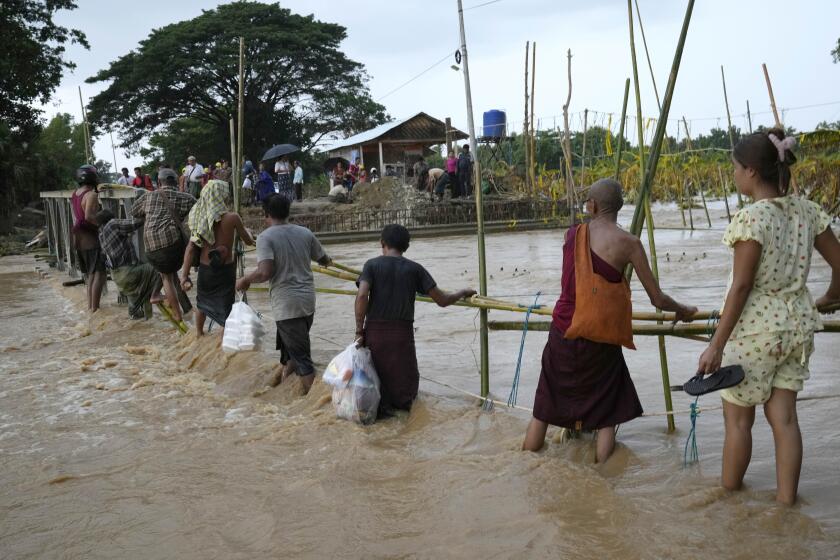More political strife in Lebanon expected after victory of U.S.-backed coalition
A U.S.-backed coalition’s election victory over an alliance led by the militant Hezbollah movement sets the stage for a new period of political discord in Lebanon, analysts and officials said Monday.
One point of contention, they noted, will be the arsenal of weapons held by the Shiite Muslim militiamen of Hezbollah.
Election officials Monday confirmed a decisive parliamentary election victory of the so-called March 14 coalition, led by pro-U.S. lawmaker and billionaire Saad Hariri, over a Shiite-Christian alliance called March 8.
Hariri’s coalition, which includes Sunni, Christian and Druze parties, won 71 of the parliament’s 128 seats. The March 8 alliance won 57, according to official numbers cited by the government news agency.
Hezbollah and its closest allies had characterized the vote as a referendum on their armed resistance to Israel. The March 14 coalition campaigned on a platform of disarming Hezbollah.
Hariri has repeatedly ruled out the possibility of granting the opposition the same veto power it received after a deal last year that ended clashes between Hezbollah and his Sunni supporters in Beirut and elsewhere. That deal allowed Hezbollah to retain its arms.
“I expect a real political crisis if March 14 digs their heels in on this,” said political analyst Amal Saad-Ghorayeb.
Signs of strife over Hezbollah’s weapons emerged immediately after the vote. Hezbollah lawmaker Mohammad Raad told Agence France-Presse on Monday that the majority must “commit not to question our role as a resistance party, the legitimacy of our weapons arsenal and the fact that Israel is an enemy state.”
Hezbollah leader Sheik Hassan Nasrallah noted that his party won big in areas of Lebanon near Israel and said it would discuss its weapons only in a “calm and objective” atmosphere.
“Saving this country requires the cooperation of everybody,” he said in a televised speech.
The more immediate challenge for both sides is forming a government, a process that is unlikely to be quickly resolved. “The political picture will not be different, but the political agreement will be tedious and will take time,” said Ghassan Azzi, a professor of political science at Lebanese University. “The March 14 coalition cannot disarm Hezbollah even if they win the whole parliament.”
Israel, whose military battled Hezbollah fighters for weeks in Lebanon in 2006, voiced doubt that moderate forces were really in charge of Lebanon. The Foreign Ministry warned in a statement that Israel still considers the Lebanese government responsible for any military or “otherwise hostile activity” from its territory.
“Lebanon is likely to remain a deeply divided country overridden by regional powers, election results aside,” journalist Avi Issacharoff wrote on the website of the Israeli daily newspaper Haaretz, citing armed conflicts between factions in the streets of Beirut last year. “With last summer’s violent showdown, Hezbollah leader Hassan Nasrallah made absolutely clear who is in charge.”
The March 14 coalition’s victory is considered an upset by most. Over the last few months, some of Hezbollah’s staunchest critics, including Hariri’s backers in Saudi Arabia, had resigned themselves to an opposition win by sending representatives to meet with the movement.
With the Shiite and Sunni districts sewn up by Hezbollah and Hariri, the election hinged on the Free Patriotic Movement of charismatic Christian leader Gen. Michel Aoun, a Hezbollah ally who failed to deliver key swing districts.
Many also point to the fiery rhetoric of Nasrallah and a critical speech made by Nasrallah Sfeir, patriarch of the Maronite Christian community, as potential factors that swayed the Christian vote toward the March 14 parties. Sfeir warned that the country was in danger, a statement seen as a blast against Hezbollah and Aoun.
Although he still managed to walk away with a large percentage of the vote, Aoun’s losses indicate that significant segments of the Christian community are still uneasy with the thought of a Lebanese state openly allied to Iran and Syria.
The Achrefieh area of Beirut “is what it really came down to, and those Christians witnessed Hezbollah on the street in 2008,” said Harvard researcher Elias Muhanna, who writes the popular Lebanese politics blog Qifa Nabki.
--
Lutz is a special correspondent. Special correspondent Raed Rafei contributed to this report.
More to Read
Sign up for Essential California
The most important California stories and recommendations in your inbox every morning.
You may occasionally receive promotional content from the Los Angeles Times.










